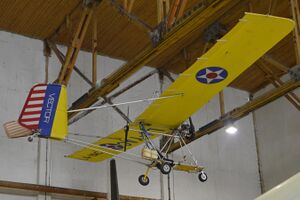Engineering:Aerodyne Systems Vector
| Vector | |
|---|---|

| |
| Aerodyne Vector 610 at Flyhistorisk Museum, Sola | |
| Role | Ultralight aircraft |
| National origin | United States |
| Manufacturer | Aerodyne Systems |
| Introduction | 1982 |
| Status | Production completed |
| Developed from | Hill Humbug |
| Variants | Ultralight Flight Mirage |
The Aerodyne Systems Vector is a family of United States ultralight aircraft that was designed by Berndt Petterson, Mike McCarron and Paul Yarnell and produced by Aerodyne Systems, introduced in 1982. The aircraft was supplied as a kit for amateur construction.[1][2]
Design and development
The Vector owes many of its design concepts to the earlier Hill Humbug and was later to inspire and influence the Ultralight Flight Mirage.[1][2]
The Vector was designed to comply with the US FAR 103 Ultralight Vehicles rules, including the category's maximum empty weight of 254 lb (115 kg). The aircraft has a standard empty weight of 195 lb (88 kg). It features a cable-braced high-wing, V-tail, a single-seat, open cockpit, tricycle landing gear and a single engine in pusher configuration.[1][2]
The aircraft is made from bolted-together aluminum tubing, with its flying surfaces covered in Dacron sailcloth. Its 80% double-surface 35.2 ft (10.7 m) span wing is supported by cables running from an inverted "V" kingpost. The landing gear's nose wheel is not steerable and a small tail caster is provided. The pilot is accommodated on an open seat, without a windshield. The engine is mounted at the wing's leading edge and powers the trailing edge-mounted pusher propeller through an extension shaft.[1][2]
The Vector series was very popular in its day and a great number were produced.[1]
Variants
- Vector 600
- Initial model, with a two-axis control system, powered by two 9 hp (7 kW) Chrysler engines.[1]
- Vector 610
- Improved model, with a structurally strengthened airframe, enlarged spoilers, elliptical wing tip extensions and powered by a single 22 hp (16 kW) Zenoah G-25B single cylinder, two-stroke engine.[1]
- Vector 627
- Powered by a single 28 hp (21 kW) single cylinder, two-stroke Rotax 277 engine.[1]
- Vector 627 SR
- Powered by a single 35 hp (26 kW) single cylinder, two-stroke Rotax 377 engine.[1]
Specifications (Vector 610)
Data from Cliche and the Virtual Ultralight Museum[1][2]
General characteristics
- Crew: one
- Length: 18 ft (5.5 m)
- Wingspan: 35.2 ft (10.7 m)
- Height: 8 ft (2.4 m)
- Wing area: 154 sq ft (14.3 m2)
- Empty weight: 195 lb (88 kg)
- Gross weight: 445 lb (202 kg)
- Fuel capacity: 5 U.S. gallons (19 L; 4.2 imp gal)
- Powerplant: 1 × Zenoah G-25B single cylinder, two-stroke aircraft engine, 22 hp (16 kW)
Performance
- Cruise speed: 45 mph (72 km/h, 39 kn)
- Stall speed: 26 mph (42 km/h, 23 kn)
- Range: 125 mi (201 km, 109 nmi)
- g limits: +5.7/-2.8
- Rate of climb: 600 ft/min (3.0 m/s)
References
- ↑ 1.0 1.1 1.2 1.3 1.4 1.5 1.6 1.7 1.8 1.9 Cliche, Andre: Ultralight Aircraft Shopper's Guide 8th Edition, page E-42. Cybair Limited Publishing, 2001. ISBN:0-9680628-1-4
- ↑ 2.0 2.1 2.2 2.3 2.4 Virtual Ultralight Museum (n.d.). "Vector 600". http://virtualultralightmuseum.com/uz.htm#vector600. Retrieved 3 January 2012.
External links
 |

